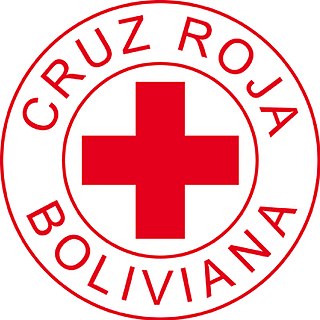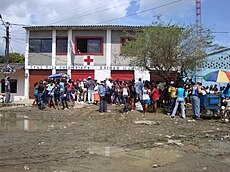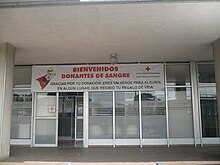
The organized International Red Cross and Red Crescent Movement is a humanitarian movement with approximately 16 million volunteers, members and staff worldwide. It was founded to protect human life and health, to ensure respect for all human beings, and to prevent and alleviate human suffering. Within it there are three distinct organisations that are legally independent from each other, but are united within the movement through common basic principles, objectives, symbols, statutes and governing organisations.
The Bojayá massacre was a massacre that occurred on May 2, 2002 in the town of Bellavista, Bojayá Municipality, Chocó Department, Colombia. Revolutionary Armed Forces of Colombia (FARC) guerrillas attacked the town in an attempt to take control of the Atrato River region from United Self-Defense Forces of Colombia (AUC) paramilitaries. During the fighting, a cylinder bomb launched by the FARC with a mortar at the AUC paramilitaries positioned by the walls of a church, went through the roof of the church instead, landing on the altar inside. Of the approximately 300 inhabitants of the town who had taken refuge in the church, 119 died in the explosion.
There are a number of meanings for the term humanitarian. Here, humanitarian pertains to the practice of saving lives and alleviating suffering. It is usually related to emergency response whether in the case of a natural disaster or a man-made disaster such as war or other armed conflict. Humanitarian principles govern the way humanitarian response is carried out.

José "Pepe" Zalaquett Daher was a Chilean lawyer, renowned for his work in the defence of human rights during the de facto regime that governed Chile under General Augusto Pinochet from 1973 to 1990.

The Bolivian Red Cross was officially founded in Bolivia on 15 May 1917 by Dr. Juan Manuel Balcazar. It has its headquarters in La Paz.

As established in the Colombian Constitution of 1991, women in Colombia have the right to bodily integrity and autonomy; to vote ; to hold public office; to work; to fair wages or equal pay; to own property; to receive an education; to serve in the military in certain duties, but are excluded from combat arms units; to enter into legal contracts; and to have marital, parental and religious rights. Women's rights in Colombia have been gradually developing since the early 20th Century.

Karen Marón is an Argentine journalist, war correspondent, producer, international analyst and writer, renowned as one of the top 100 most influential war correspondents in the world in covering armed conflicts, with coverage in more than 30 countries since 2000. As international correspondent specialized in armed conflicts and international politics she has covered conflicts in the Middle East, Latin America, Persian Gulf including the most dangerous places of the world as Iraq, Syria, Lebanon, Colombia, Libya and the Israeli–Palestinian conflict from the Second Intifada up to Israel's military offensive on Gaza Strip.
The Permanent Assembly for Human Rights is an Argentine non-governmental human rights organization; founded in 1975. According to its official website the organization is the product of a "call from people coming from distinct areas: the church, politics, Human Rights, sciences, culture, and labour Argentinians in response to the increasing violence and the collapse of the most elemental Human Rights in the country".

Protection International (PI) is an international non-profit organisation dedicated to the protection of human rights defenders (HRDs). Its stated mission is to enhance the security and the protection of "threatened civil society actors with non-violent means, especially those who fight for their legitimate rights and for the rights of others as they are guaranteed by the international humanitarian law and the human rights conventions".

The Spanish National Health System is the agglomeration of public healthcare services that has existed in Spain since it was established through and structured by the Ley General de Sanidad of 1986. Management of these services has been progressively transferred to the distinct autonomous communities of Spain, while some continue to be operated by the National Institute of Health Management, part of the Ministry of Health and Social Policy. The activity of these services is harmonized by the Interterritorial Council of the Spanish National Health Service in order to give cohesion to the system and to guarantee the rights of citizens throughout Spain.

The Algerian Red Crescent is an Algerian humanitarian volunteer organization founded in 1957. It has been recognized by the International Red Cross and Red Crescent Movement only since 1963.

Mauro Cabral Grinspan, also known as Mauro Cabral, is an Argentinian intersex and trans activist, who serves as the Senior Officer for Gender Justice and Equity at the Global Philanthropy Project. Before that, he was the Executive Director of GATE. His work - as a signatory of the Yogyakarta Principles - focuses on the reform of medical protocols and law reform. In July 2015, Cabral received the inaugural Bob Hepple Equality Award.

Since March 15, 2022, Chile bans discrimination based on "sex characteristics" under Law 21,430 on Guarantees and Integral Protection of the Rights of Children and Adolescents. Between December 2015 and August 2016, the Chilean Ministry of Health issued a regulatory suspension of non-necessary cosmetic medical interventions on intersex children. The guidelines were replaced by guidance permitting intersex medical interventions.

In Mexico there are no explicit rights reserved to intersex persons, no protections from non-consensual cosmetic medical interventions on intersex children and no legislative protection from discrimination. Intersex persons may have difficulties in obtaining necessary health care.

Dejusticia is a non-profit legal organization established in 2005 that promotes human rights and the social rule of law in Colombia, Latin America and other regions of the Global South.

During the presidential crisis between the Venezuelan governments of Nicolás Maduro and Juan Guaidó, a coalition of Colombia, Brazil, the United States and the Netherlands attempted to bring essential goods as a response to shortages in Venezuela. The three main bases used for the operation are: the Colombian city of Cúcuta, the Brazilian state of Roraima,, and the island of Curaçao, of the Kingdom of the Netherlands.
The Jaime Brunet International Prize was established in 1998 with the objective of distinguishing people, organizations and institutions that promote the defence of human rights. It is awarded by the Jaime Brunet Foundation of the UPNA. This award also aims to recognize the work of those who fight to eliminate situations of inhumane or degrading treatment in violation of people's inherent rights to dignity. The prize consists of a diploma, a sculpture commemorating the award and €36,000 in cash.
María Elena Urritia was a Mexican journalist, writer, researcher, and activist. She played a key role in starting the feminist magazine Fem. She was the fourth of six children born to conservative Catholic parents.

Colombia Justa Libres is a right-wing Colombian political party founded in 2017 that groups the majority of evangelical denominations in the country together. This includes, among others, Assemblies of God, Foursquare Church, Peace Mission to the Nations, and Spring of Eternal Life. During the 2018 Colombian parliamentary election, four of its members were elected to the Congress of Colombia. After the 2022 legislative election, the party formed the Nos Une Colombia coalition with the MIRA. It has the slogan "Let's do it together!" and a youth wing known as "RUGE!".

















